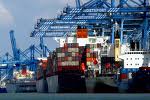The ASEAN-India Free Trade Agreement (AIFTA) came into effect on 1 January 2010 for Malaysia and India. It is a remarkable milestone towards a freer market environment, and an important agreement for Malaysia as India is emerging as an important trading partner as well as a market for Malaysian exports. This FTA creates a market of 1.7 billion people with combined GDP of US$2.8 trillion and combined global trade of over US$2 trillion. Under the AIFTA, ASEAN Member States and India have agreed to progressively reduce and eliminate duties on substantial number of products over a period of 3-8 years beginning 1 January 2010. The Philippines, Cambodia, Lao PDR, Myanmar and Viet Nam are given an additional 2-3 years to reduce and eliminate their duties under this FTA.
Dato’ Sri Mustapa Mohamed says that Malaysia is committed to eliminate import duties on 6,792 products or tariff lines by 31December 2013, while duties on another 1,266 tariff lines would be eliminated by 31 December...
Read MoreTag Archives: tariff
July 1, 2015 , by admin2

Free trade agreements now in place between Malaysia on a bilateral and regional basis - mean Malaysian exporters are able to export their products to selected countries and can qualify for preferential rates of import duties.
All the FTAs have their own specific set of Rules Of Origin (ROO). They are not standard.Exporters take note - study the ROO so as not to be denied preferential tariffs when exporting your products.
Read MoreJune 15, 2015 , by admin2
KOTA BAHARU, March 1 (Bernama) — Member countries will continuously reduce non-tariff measures and non-tariff barriers for freer intra ASEAN trade, said International Trade and Industry Minister Datuk Seri Mustapa Mohamed Sunday.
Mustapa said 69 non-tariff measures had been identified, and of this, 45 had been resolved.
“We have decided to make more progress. We have identified many more and we will try to resolve those,” he told a press conference on the final day of the 21st ASEAN Economic Ministers’ Retreat (AEM) here.
The Economic Ministers also proposed to form a mechanism to deal with non-tariff measures in facilitating the movement of businesses within the region.
“We are looking at a formal platform. We are talking to the European Union, to see how we can share best practices with them,” said Mustapa.
ASEAN Deputy Secretary General for the ASEAN Economic Community Dr Lim Hong Hin said a systematic mechanism would be developed to allow the private...
Read More
 1932 Views
1932 Views